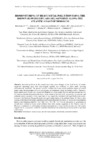Please use this identifier to cite or link to this item:
https://accedacris.ulpgc.es/jspui/handle/10553/114484
| Title: | Biomonitoring of heavy metal pollution using the brown seaweed Ericaria Selaginoides along the Atlantic coast of Morocco | Authors: | Boundir, Y. Haroun Tabraue, Ricardo Jesús Sánchez De Pedro, R. Hasni, M. Ouazzani, N. Mandi, L. Rafiq, F. Weinberger, F. Cherifi, O. |
UNESCO Clasification: | 330811 Control de la contaminación del agua 241707 Algología (ficología) 230318 Metales |
Keywords: | Bioindicator Ecotoxicology Marine Water Quality Monitoring Seaweed Resilience |
Issue Date: | 2022 | Journal: | Applied Ecology and Environmental Research | Abstract: | Increased pollution in the coastal areas may cause changes in the biodiversity of marine organisms depending upon their physiological capacity and resilience to thrive under stressing environmental conditions. The present research evaluates the heavy metals pollution degree of coastal waters using the macroalgae Ericaria selaginoides as bioindicator along the Atlantic coast of Morocco. Eight stations were chosen: Two located near Eljadida city, three nearby Safi city and three around the city of Essaouira. Results showed that the heavy metal content in the thalli of E. selaginoides, in seawater and sediment varied seasonally. At the same time, it was negatively correlated with algal biodiversity onsite. However, the Chemical Oxygen Demand was significantly higher at the polluted station S5 than at other stations, while Dissolved Oxygen and Biological Oxygen Demand were lower. E. selaginoides accumulated metals in the following order Fe > Zn > Mn > Cu > Ni > Pb > Cr > Cd. In conclusion, E. selaginoides is overall more resilient to heavy metal pollution than other marine organisms in the Atlantic coast of Morocco, as indicated by substantially elevated concentrations of heavy metals in some sites. Our results support that E. selaginoides would be a suitable bioindicator for monitoring of heavy metals in polluted coastal areas. | URI: | https://accedacris.ulpgc.es/handle/10553/114484 | ISSN: | 1589-1623 | DOI: | 10.15666/aeer/2001_021041 | Source: | Applied Ecology and Environmental Research [ISSN 1589-1623], v. 20 (1), p. 21-41, (Enero 2022) |
| Appears in Collections: | Artículos |
SCOPUSTM
Citations
5
checked on Jun 8, 2025
WEB OF SCIENCETM
Citations
4
checked on Jan 25, 2026
Page view(s) 10
99
checked on Jan 10, 2026
Download(s)
29
checked on Jan 10, 2026
Google ScholarTM
Check
Altmetric
Share
Export metadata
Items in accedaCRIS are protected by copyright, with all rights reserved, unless otherwise indicated.
